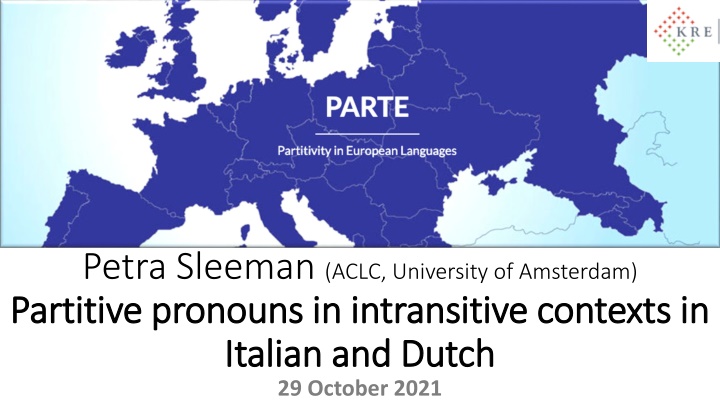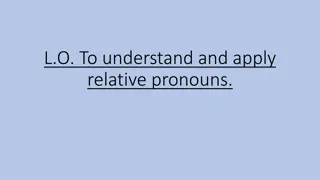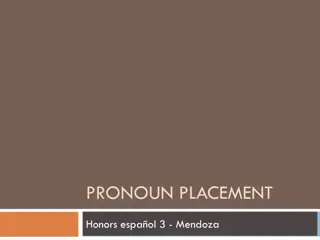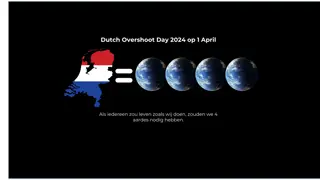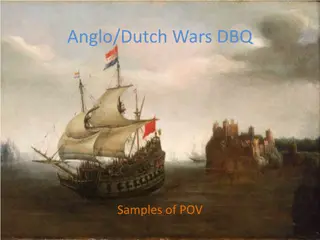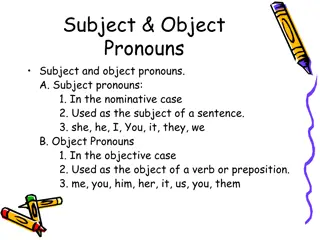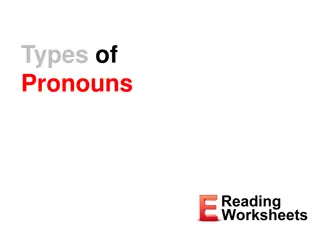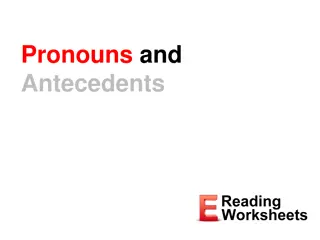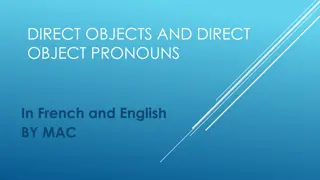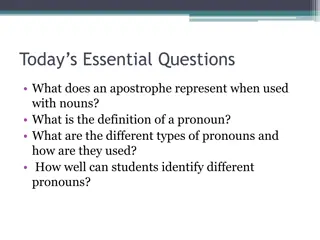Partitive Pronouns in Italian and Dutch: A Comparative Analysis
This study explores the use of partitive pronouns in intransitive contexts in Italian and Dutch, examining their roles in both languages. The research delves into the nuances of partitive pronouns, their syntactic structures, and their interactions with direct objects and quantified adverbial phrases. Through examples and analyses, the paper sheds light on the differences and similarities in the use of partitive pronouns between Italian and Dutch.
Uploaded on Sep 18, 2024 | 3 Views
Download Presentation

Please find below an Image/Link to download the presentation.
The content on the website is provided AS IS for your information and personal use only. It may not be sold, licensed, or shared on other websites without obtaining consent from the author.If you encounter any issues during the download, it is possible that the publisher has removed the file from their server.
You are allowed to download the files provided on this website for personal or commercial use, subject to the condition that they are used lawfully. All files are the property of their respective owners.
The content on the website is provided AS IS for your information and personal use only. It may not be sold, licensed, or shared on other websites without obtaining consent from the author.
E N D
Presentation Transcript
Petra Sleeman (ACLC, University of Amsterdam) Partitive pronouns in intransitive contexts in Partitive pronouns in intransitive contexts in Italian and Dutch Italian and Dutch 29 October 2021
Introduction Partitive pronouns (Giusti & Sleeman, in press): Ik heb drie boeken Ik heb ER I have three books I have three books. I have three. a. NE ho PART.CL I-have three I have three. b. Hai libri? you-have books Do you have books? Yes, I have. (1) drie. I have PART.WK three (2) tre. S , yes NE ho. PART.CL I-have 2
Introduction cerises J EN (3) J ai I have eaten I ate cherries. I ate some. mang des ai mang . PART.DET.PL cherries I PART.CL have eaten Bentley (2004): NE typically occurs with the elliptical direct object of a transitive verb. NE can also occur with intransitive verbs, viz. unaccusatives: (4) NE PART.CL arrive-3PL many-M.PL (Of them) many arrive. arrivano molti. 3
Introduction Dutch partitive (quantitative) pronoun ER (Corver & van Koppen, 2018): It typically occurs in clausal environments featuring a(n indefinite) direct object noun phrase whose nominal head is empty, possibly as the result of movement of the partitive pronoun, and which is introduced by a cardinal or indefinite quantifier 4
Introduction Belletti & Rizzi (1981): in Italian, the partitive pronoun NE is used in combination with noun-less direct objects, but not in combination with noun-less quantified adverbial NPs: (5) a. Gianni trascorrer tre Gianni will.spend three weeks Gianni will spend three weeks in Milan. Gianni NE trascorrer tre Gianni PART.CL will-spend three in Milan Gianni will spend three in Milan. settimane a Milano. in Milan b. a Milano. 5
Introduction (6) a. Gianni rimasto Gianni is remained three weeks Gianni remained three weeks in Milan. *Gianni NE rimasto Gianni PART.CL is remained three in Milan Gianni remained three in Milan. tre settimane a Milano. in Milan b. tre a Milano. Belletti & Rizzi account for the difference by claiming that NE can only be extracted from an argument position. 6
Introduction (7) a. Questo scaffale misura due metri this shelf measures two meters This shelf measures two meters. ?Questo scaffale NE misura due this shelf PART.CL measures two This shelf measures two. ?(Di ore) NE dorme otto of hours PART.CL sleeps.3P.SG eight S/he sleeps eight of them, hours. b. [Belletti & Rizzi, 1981: marginal] (8) [Beninc , 1988: non elegant] 7
Introduction Barbiers (2017): (9) a. Ik heb twee dagen in Spanje doorgebracht. I have two days in Spain spent I have spent two days in Spain. Ik heb ER twee in Spanje doorgebracht. I have PART.WK two in Spain spent I have spent two in Spain. b. 8
Introduction (10) a. Ik ben twee dagen in Spanje gebleven. I am two days in Spain remained I have remainded two days in Spain. *Ik ben ER twee in Spanje gebleven. I am PART.WK two in Spain b. remained 9
Introduction However, Will (2019) shows that on the internet the verb costare cost is frequently attested with NE in all registers of the language: (11) olio greco e spagnolo, che costa poco pi di due euro al litro oil Greek and Spanish that costs little more than two euros per.the liter e quello italiano, che NE costa invece circa 6. and the.one Italian that PART.CL costs instead around 6 Greek and Spanish oil, which costs little more than two euros per liter and Italian oil, which, in contrast, costs 6 euros. 10
Introduction (12) a. ?Il libro NE the book.MASC.SG PART.CL is cost.MASC.sg five.MASC.SG of dollars ?Il libro NE costati cinque the book.MASC.SG PART.CL is cost.MASC.PL five. MASC.PL of dollars The book has cost five of them, dollars. costato cinque (di dollari) b. (di dollari) 11
Introduction (13) ??Questi libri NE sono costate cinque ( di lire). these book.MASC.PL of.them are cost.FEM.PL five.FEM.PL of lira.FEM.PL (14) *Questi libri NE sono costata una ( di lira). these book.MASC.PL of.them are cost.FEM.SG one.FEM.SG of lira.FEM.SG These books have cost one of them, lira. 12
Introduction According to Bennis (1986), ER has to be used both with a direct object and with a quantified adverbial NP : (15) a. Hoeveel how-many have you PART.WK bought Have many did you buy? Van die vier weken ben ik *(ER) twee in Milaan gebleven of those four weeks am I PART.WK two in Milano remained Of those four weeks I remained two in Milan. heb jij *(ER) gekocht? b. 13
Introduction Research questions: May extraction from quantified adverbial NPs be more acceptable than has generally been claimed in the literature, at least with some verbs? Does a sentence like *Gianni NE rimasto tre a Milano become more acceptable if no periphrastic perfect is used, avoiding an agreement judgment? 14
Methodology A Grammaticality Judgment Task was submitted to native speakers of Italian and Dutch. Recruited by means of social media. Google Forms. Correct - Incorrect For Italian: 23 native speakers, 90 sentences. For Dutch: 30 native speakers, 75 sentences. Dutch post-hoc test: 28 native speakers, 28 sentences. 15
Results for Italian Intransitive verb with NE (coordinated sentences) (16) (17) [Rimarr quattro giorni a Roma] e NE rimarr due a Napoli. (65%) I will stay four days in Rome and I will stay two in Naples. [Eva ha dormito otto ore,] ma Claudia NE ha dormite solo quattro. (87%) Eva has slept eight hours, but Claudia has slept only four. [Ieri ho nuotato due chilometri] e oggi NE ho nuotato uno. (78%) Yesterday I have swum two kilometers and today I have swum one. (18) 16
Results for Italian Intransitive verb without NE (coordinated sentences) (19) (20) (21) [Rimarr quattro giorni a Roma] e rimarr due a Napoli. (26%) [Eva ha dormito otto ore,] ma Claudia ha dormito solo quattro. (13%) [Ieri ho nuotato due chilometri] e oggi ho nuotato uno. (4%) 17
Results for Italian Rimanere (non-coordinated sentences) (22) [Gianni rimasto tre settimane a Milano] - Gianni NE rimasto tre a Milano. (13%) [Gianni rimasto tre settimane a Milano] - Gianni NE rimaste tre a Milano. (26%) [Gianni rimasto tre settimane a Milano] - Gianni rimasto tre a Milano. (0%) (23) (24) 18
Results for Dutch Intransitive verb with ER (coordinated sentences) (25) [Ik zal vier dagen in Rome blijven] en ik zal ER twee in Napels blijven. (83%) I will stay four days in Rome and I will stay two in Naples. [Iris heeft acht uur geslapen,] maar Koen heeft ER maar vier geslapen. (77%) Eva has slept eight hours, but Claudia has slept only four. [Gisteren heb ik n kilometer gezwommen] en vandaag heb ik ER twee gezwommen. (93%) Yesterday I have swum two kilometers and today I have swum one. (26) (27) 19
Results for Dutch Intransitive verb without ER (coordinated sentences) (28) (29) (30) [Ik zal vier dagen in Rome blijven] en ik zal twee in Napels blijven. (20%) [Iris heeft acht uur geslapen,] maar Koen heeft maar vier geslapen. (30%) [Gisteren heb ik n kilometer gezwommen] en vandaag heb ik twee gezwommen. (13%) 20
Results for Dutch Intransitive verb with ER (non-coordinated sentences) in post-hoc test (31) [Ik ben twee dagen in Spanje gebleven.] - Ik ben ER twee in Spanje gebleven. (68%) [Koen heeft maar vier uur geslapen] - Koen heeft ER maar vier geslapen. (46%) [Ik heb twee kilometer gezwommen.] Ik heb ER twee gezwommen. (86%) (32) (33) 21
Discussion May extraction from quantified adverbial NPs be more acceptable than has generally been claimed in the literature, at least with some verbs? Yes, both in Italian (77%) and in Dutch (86% in the coordinated sentences and 67% in the non-coordinated sentences). 22
Discussion Does a sentence like *Gianni NE rimasto tre a Milano become more acceptable if no periphrastic perfect is used, avoiding an agreement judgment? (34) (35) [Rimarr quattro giorni a Roma] e NE rimarr due a Napoli. (65%) I will stay four days in Rome and I will stay two in Naples. [Gianni rimasto tre settimane a Milano] - Gianni NE rimasto tre a Milano. (13%) [Gianni rimasto tre settimane a Milano] - Gianni NE rimaste tre a Milano. (26%) [Eva ha dormito otto ore,] ma Claudia NE ha dormite solo quattro. (87%) Eva has slept eight hours, but Claudia has slept only four. (36) (37) 23
Discussion If we assume that Belletti & Rizzi s (1981) analysis of the use of the partitive pronoun is essentially correct, the fact that native speakers accept the combination of the partitive pronoun with an elliptical adverbial NP may be interpreted in two ways: 1. The participants may unconsciously or consciously have compared the variants with and without the partitive pronoun. Since leaving out the partitive pronoun is not an option, the speakers may have accepted the use of the partitive pronoun. 2. There may be variation w.r.t. grammars between speakers. There are speakers who analyze quantified adverbial NPs as non-arguments and others who analyze them as arguments. 24
Discussion Circumstancial adverbials place, time, manner and the like follow the verb s complement within the VP and they are typically realized in prepositional form or in a bare NP form (Cinque 1999). (38) Les souffrances que ce travail m a co t es. the sufferings that this work me has cost The sufferings that this work has cost (caused) me. (39) Les trois mille the three thousand euros that this furniture me has cost The three thousand euros that this furniture has cost me. euros que ce meuble m a co t . 25
Discussion In Majorcan Catalan, there can only be (optional) agreement with the following complement if it is an argument, but not if it is an adverbial complement (Salv 2017): (40) En Joan ja ART Joan already has weighed{FEM.PL/M.SG} the potatoes.FEM.PL Joan has already weighed the potatoes. Es mel ha {*pesades/pesat} vuit lliures. the melon has weighed {FEM.PL/M.SG} eight pounds.FEM.PL The melon has weighed eight pounds. ha {pesades/pesat} ses patates. (41) 26
Discussion In Korean and English, the domain of direct case assignment is expanded to include measure expressions (Wechsler & Lee 1996; Stroik 1990): (42) Tom-un twu sikan-tongan-ul tali-ess-ta Tom-TOP two hour-period-ACC run-PST-DEC Tom ran for two hours. 27
Discussion In Dutch, attributive passive participles combine with a noun that is interpreted as their internal argument, which may be the internal argument of a transitive or an unaccusative verb (Elffers, de Haan & Schermer 2014): (43) de ge nvesteerde minuten the invested minutes (44) de gestorven soldaten the died soldiers 28
Discussion (45) de geslapen uren (82,5%) the slept hours (46) de gezwommen meters (96,3%) the swum meters (47) ??de te lang gebleven minuten (51,9%) the too long stayed minutes 29
Conclusion Violation of syntactic constraint on the extraction of partitive pronoun from adverbial NPs by native speakers of Italian and Dutch; Belletti s & Rizzi s judgments may have been influenced by perfect tense; If violation is only apparent, two explanations: Use of partitive pronoun is better than leaving it out; Analysis of adverbial NP as direct object; More research is needed. 30
References Barbiers, Sjef. 2017. Kwantitatief er en ze. Nederlandse Taalkunde 22(2). 163-187. Belletti, Adriana & Luigi Rizzi. 1981. The syntax of NE . Some theoretical implications. The Linguistic Review 1(2). 117-154. Beninc , Paola. 1988. L ordine degli elementi della frase e le costruzioni marcate. In Lorenzo Renzi (ed.), Grande grammatica italiana di consultazione, vol. 1, 115-227. Bologna: il Mulino. Bennis, Hans. 1986. Gaps and dummies. Dordrecht: Foris. Bentley, Delia. 2004. Ne-cliticisation and split intransitivity. Journal of Linguistics 40(2). 219-262. Cinque, Guglielmo. 1999. Adverbs and functional heads. A cross-linguistic perspective. Oxford: Oxford University Press. Corver, Norbert & Marjo Koppen, van. 2018. Dutch. In Jeroen Van Craenenbroeck & Tanja Temmerman (eds.), The Oxford handbook of ellipsis, 721-764. Oxford: Oxford University Press. Elffers, Els, Sies de Haan & Ina Schermer. 2014. Het voltooid deelwoord in het Nederlands: beperkingen op het attributief gebruik. Nederlandse Taalkunde 19(1). 47-76. Giusti, Giuliana & Petra Sleeman. In press. Partitive elements in the languages of Europe: An advancement in the understanding of a multifaceted phenomenon. In Petra Sleeman & Giuliana Giusti (eds.), Partititive determiners, partitive pronouns and partitive case, ix-xxxviii. (Linguistische Arbeiten 580). Berlin: de Gruyter. Stroik, Thomas. 1990. Adverbs as V-sisters. Linguistic Inquiry 21. 654-661. Wechsler, Stephen & Yae-Sheik Lee. 1996. The domain of direct case assignment. Natural Language & Linguistic Theory 14(3). 629- 664. Will, Kimberly Page. 2019. The semantic and pragmatic functions of partitive clitic NE in Italian. PhD dissertation, Cornell University. 31
